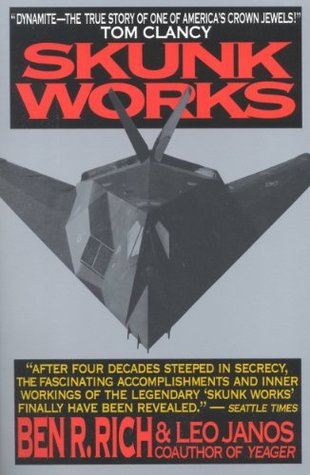More on this book
Community
Kindle Notes & Highlights
by
Ben R. Rich
Read between
January 2 - March 22, 2025
I explained that it was cheaper to buy and update the airplane now rather than wait for crashes or losses, because in ten years costs rise by a factor of ten. He just couldn’t see the logic. So I told him the story of the kid who proudly tells his father that he saved a quarter by running alongside a bus rather than taking it. The father slapped the kid on the head for not running next to a taxi and saving a buck fifty.
Everything about this project was dark alley, cloak and dagger. Even the way they financed the operation was highly unconventional: using secret contingency funds, they back-doored payment to Lockheed by writing personal checks to Kelly for more than a million bucks as start-up costs. The checks arrived by regular mail at his Encino home, which had to be the wildest government payout in history.
The pilot needed an iron butt for ten-hour flights. “I ran out of ass before I ran out of gas,” some U-2 drivers would later complain—and who could blame them?
But spy satellites had distinct limitations: their pictures in those days were not very sharp, and their orbits were fixed, so the Russians would learn to hide secrets before each scheduled overflight. By contrast, a spy plane operated on no fixed schedules, could loiter in areas of interest, and could overfly tension spots within hours.
Eighty percent efficiency would get the job done, so why strain resources and bust deadlines to achieve that extra 20 percent, which would cost as much as 50 percent more in overtime and delays and have little real impact on the overall performance of the aircraft itself?
Kelly’s rule was never put an engineer more than fifty feet from the assembly area.
The Blackbirds flew 3,500 operational sorties over Vietnam and other hostile countries, had more than one hundred SAM SA-2 missiles fired at them over the years, and retired gracefully in 1990 after twenty-four years of service as the only military airplane never to be shot down or lose a single crewman to enemy fire.
We had set two records: L.A. to D.C. in only sixty-four minutes and Kansas City to D.C. in twenty-six minutes. And we had set a new transcontinental speed record, covering 2,404 statute miles in only sixty-seven minutes, fifty-four seconds. It was also the first time that a sonic boom had traversed the entire length of our great country.
“I’ll teach you all you need to know about running a company in one afternoon, and we’ll both go home early to boot. You don’t need Harvard to teach you that it’s more important to listen than to talk. You can get straight A’s from all your Harvard profs, but you’ll never make the grade unless you are decisive: even a timely wrong decision is better than no decision. The final thing you’ll need to know is don’t half-heartedly wound problems—kill them dead. That’s all there is to it. Now you can run this goddam place. Now, go on home and pour yourself a drink.”
And keeping things small cuts down on raises and promotions. Hell, in the main plant they give raises on the basis of the more people being supervised; I give raises to the guy who supervises least. That means he’s doing more and taking more responsibility. But most executives don’t think like that at all.
One curious idea developed by Ronald Reagan’s secretary of the Navy, John Lehman, and adapted by the Air Force and other service branches as well, was something called leader-follower competition. The rule of this game was that the winner of a competitive bidding competition had to turn over his winning design to the loser. The loser would then learn how to build the winner’s product, and by the third year of production the loser would be allowed to bid on the project against the winner.
Another sound management practice that is gospel at the Skunk Works is to stick with reliable suppliers. Japanese auto manufacturers discovered long ago that periodically switching suppliers and selecting new ones on the basis of lowest bidders proved a costly blunder. New suppliers frequently underbid just to gain a foothold in an industry, then meet their expenses by providing inferior parts and quality that can seriously impair overall performance standards. And even if a new supplier does produce quality parts according to the specifications, his parts will not necessarily match those
...more


